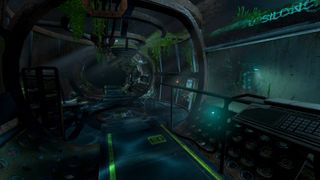How games like Myst and Soma helped me confront my fear of being alone
Spoilers for Myst, The Talos Principle, and Soma below
I must have been nine or ten the first time I played Myst. My dad had just purchased a new computer (complete with a top-of-the-line 4X CD-ROM drive!), and at the time, Myst was the hotness. Full motion video, breathtaking graphics, and intricate puzzles that could only be rendered by state-of-the-art 486 Pentium Processors. My dad bought it with the intention of playing it with me, and we did for a while, but he grew bored of it - video games were never really his thing, so it was left to me to finish what we'd started.

Myst is a difficult game for a grown adult to finish, let alone a ten year old. I did my best, trying to piece together its clues and solve its esoteric puzzles, but ultimately, I ended up falling back on the strategy guide that came with the copy we bought for assistance. The guide helped to dull the eerily serene and lonesome atmosphere of the island, but it couldn't prepare me for the final confrontation between Sirrus and Achenar, two brothers trapped in individual books who call on you for help throughout your adventure.
The object of Myst, at least as first presented, is to find a series of red and blue pages, each one corresponding to one of the two books the brothers are trapped inside. At first, your discussions are brief, as the video 'signals' coming from each book are rife with static, like tuning in-between channels on an analog television set. Bringing pages to each book clears up the 'signal', which allows you to talk with them a bit more each time. By following the guide, I knew that Sirrus and Achenar would betray you if you brought either of them the last page of their respective books, and so the true ending involved finding a hidden passage and the acquisition of a bunch of white pages, allowing you to find their benevolent father, Atrus, who deals with them in his own way.

So I did that and hooray, game over, I win, etc. But I was curious - what would happen if I brought either Sirrus or Achenar the final page? I reloaded an old save, brought the final red page to Sirrus, and suddenly, I find myself inside the book, with Sirrus standing in the library where I once was. He starts tearing the pages out of the book. The static grows, Sirrus' cackling fades until all that's left is a bunch of white noise. I'm now stuck in this book forever.
I'm ten. I'm staring at my computer screen, existential dread washing over me for the first time in my life. My parents aren't home, and they won't be for at least another hour or two. My sister is at her friend's house. I suddenly realize just how alone I am, both in that moment, and on a universal level. Myst gave me nightmares for months.
But Myst also helped me confront the fears I'd had for a very, very long time. As a child I struggled with separation anxiety. I'd worry when my parents left for an extended amount of time that, if they didn't come back at the exact time they specified, they would disappear forever. And this was before cell phones and text messages, so there was no way to contact them just to give me some peace of mind. Many times I'd find myself in a horrific loop of doubt, unable to divide by zero, until the anxiety consumed me completely. That's the problem with irrational fear - you know that there's no reason to worry, and yet, on some intrinsic level, it still haunts you, building upon itself exponentially until your fear sends you on a downward spiral that you can't pull yourself out of.
Sign up to the 12DOVE Newsletter
Weekly digests, tales from the communities you love, and more

In being forced to face my own mortality and the soul-crushing loneliness of eternity - even in a digital form such as Myst - something got shaken loose. After the initial shock had worn off, I found myself being able to deal with my parents going out and leaving me on my own. I grew comfortable with not needing the sound of the television on in another room to numb the pain of silence. The change was slow and gradual - but I'd been to the other side and realized things were going to be OK, no matter what happened. And ironically, I've found myself drawn toward those types of games even more now because of my experience with Myst. Armed with this newfound confidence, I wanted to confront my biggest fears head on.
I don't typically play too many horror games, but there are times that I've found horror in the unlikeliest of places because of this crushing sense of eternal loneliness. One of the most affecting games I've played recently was The Talos Principle. At first, it seems rather benign - you're a robot, solving puzzles in ornate settings based on the civilizations of antiquity. But the deeper you dig, the more alone you realize you really are. Humanity has been completely wiped out by a terrible disease, and the only things that remain are a handful of message board posts, a few philosophical essays, and you: an artificial intelligence attempting to transcend your digital confines. There's a hopeful message in The Talos Principle, but it's ultimately bittersweet - even if you 'win' and take on the physical confines of a robotic body, there's no bringing actual people back. The world remains barren, save for the few other AIs you're able to bring with you. The human race remains lost.

And then there's Soma. Hoooooo boy, there's Soma. Soma actually shares a lot of themes in common with The Talos Principle, but it's a much more conventional horror game, and far more bleak. It's set in a research facility on the bottom of the ocean called PATHOS-II - literally the furthest you can get from the rest of humanity without leaving the planet entirely - and something has gone horribly wrong. You were about to undergo an experimental treatment in the early 21st century, but you find your consciousness propelled forward to the year 2104. Humanity has been destroyed by a comet a year before, and its 'last hope' is the ARK: a high-tech device that can house the copied consciousnesses of a lucky few. I put 'last hope' in quotes because there is no hope. The last remnants of humanity are the few people who survived on PATHOS-II, and most of them have died. Even if you complete your goal and launch the ARK into orbit around the sun, it has maybe a thousand years of operating life or so before it too succumbs to entropy - a ready-made coffin with a built-in time limit.
Soma is an effective horror game not because of the few monsters you have to duck around while you play - honestly, Soma would be more effective without the supernatural monsters - but because everything you see is a reminder of the fragility of humanity and how easily it can be washed away. The few people you do meet are constructs - copies of actual people placed inside machines - and without power, they might as well not exist. You find an engineer named Catherine and transfer her consciousness to your futuristic utility tool. The thing is, she can't interact with you unless she's plugged into one the underwater station's few terminals. You spend much of the game alone, with only your thoughts and the echo of your breathing inside your helmet to keep you company. When you do find a terminal to plug Catherine into, being able to converse with someone else feels like finally gulping in air after holding your breath for hours.

At the end, victory seems within reach. You load the ARK into the space gun, copy your consciousnesses over to it, and the gun fires at the last possible second. But it's a Pyrrhic victory: your own consciousness stays in your body on Earth, while your copy gets to gallivant in digital forests with your friends for the next thousand years. Catherine's terminal breaks, sparks fly, and the lights go dark for the last time - you are now completely, utterly alone. When I finished Soma, I got flashbacks to my experiences with Myst and that panic of never-ending loneliness washed over me again. With twenty more years of life experience, I'm far better equipped mentally and emotionally to deal with the philosophical questions such an ending poses, but it's an ending that still gnaws away at me to my very core.
To me, horror games like Soma, and even non-horror games Myst or The Talos Principle, are more haunting than most because they rely not on jump scares, but the existential terror of being permanently separated from other humans. Jump scares are effective, but they're cheap and fleeting. They don't stick with you the way Soma lets you decide whether or not to euthanize the last living human in existence; the way that The Talos Principle reminds you that all of humanity's greatest achievements, its paintings, sculptures, writings, all amount to nothing if no one's around to experience them; or the way Myst slowly traps you in an eternal prison with no hope of escape. But it's a fear I grapple with willingly now, in an attempt to gaze into a fraction of infinity and walk away a little more prepared each time.

The Sims is back after 25 years, and it's teaching Sims 4 players a lesson in retro life sim difficulty: "Damn this game is hard"

After 11 years of no support from EA, The Sims 2 mods are harder to find than ever, but one fan has a "masterlist" of over 200 with everything from Bigfoot Romance to CAS overhauls
Most Popular




